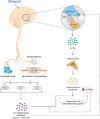The role of the immune system in posttraumatic stress disorder
- PMID: 35927237
- PMCID: PMC9352784
- DOI: 10.1038/s41398-022-02094-7
The role of the immune system in posttraumatic stress disorder
Abstract
Posttraumatic stress disorder (PTSD) develops in a subset of individuals upon exposure to traumatic stress. In addition to well-defined psychological and behavioral symptoms, some individuals with PTSD also exhibit elevated concentrations of inflammatory markers, including C-reactive protein, interleukin-6, and tumor necrosis factor-α. Moreover, PTSD is often co-morbid with immune-related conditions, such as cardiometabolic and autoimmune disorders. Numerous factors, including lifetime trauma burden, biological sex, genetic background, metabolic conditions, and gut microbiota, may contribute to inflammation in PTSD. Importantly, inflammation can influence neural circuits and neurotransmitter signaling in regions of the brain relevant to fear, anxiety, and emotion regulation. Given the link between PTSD and the immune system, current studies are underway to evaluate the efficacy of anti-inflammatory treatments in those with PTSD. Understanding the complex interactions between PTSD and the immune system is essential for future discovery of diagnostic and therapeutic tools.
© 2022. The Author(s).
Conflict of interest statement
The authors declare no competing interests.
Figures




References
-
- American Psychiatric Association. Diagnostic and Statistical Manual of Mental Disorders. 2013.
-
- O’Donnell CJ, Schwartz Longacre L, Cohen BE, Fayad ZA, Gillespie CF, Liberzon I, et al. Posttraumatic stress disorder and cardiovascular disease: state of the science, knowledge gaps, and research opportunities. JAMA Cardiol. 2021;6:1207–16. - PubMed
Publication types
MeSH terms
Grants and funding
LinkOut - more resources
Full Text Sources
Medical
Research Materials

